Latest Posts
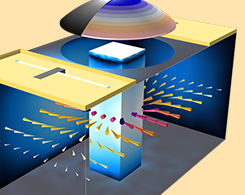
High-Fidelity Modeling of a Tunable Filter via Multiphysics Simulation
Tunable cavity filters can enhance the development of high-speed, wireless communication networks. To optimize these devices for such a purpose, we can turn to high-fidelity modeling.

How to Perform Multimaterial Optimization in COMSOL Multiphysics®
Does a tuning fork sound better when made out of aluminum instead of copper or steel? In COMSOL Multiphysics®, you can perform an optimization study for multiple materials to find out.

How to Use the Parameter Estimation Study Step for Inverse Modeling
This blog post includes a tutorial video. Watch it to learn the steps for performing a parameter estimation study for inverse modeling in COMSOL Multiphysics®.

Coastal Erosion Uncovers Buried Tracks from Throughout History
In 2018, a series of winter storms caused severe erosion along a U.S. coastline, uncovering footprints and horse-and-buggy tracks from centuries earlier.
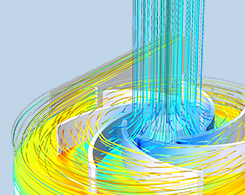
Using the Algebraic Multigrid (AMG) Method for Large CFD Simulations
There’s an ideal method for solving large CFD simulations that involve complex geometries. It’s called the algebraic multigrid (AMG) method, and you can learn all about it here.

Happy Birthday, Pierre-Simon Laplace
Pierre-Simon Laplace contributed to celestial mechanics and helped develop an equation for pressure across a curved surface. He also had his demons. The Laplace demon thought experiment, that is.
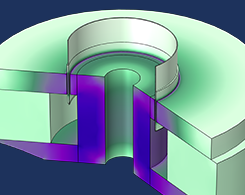
Topology Optimization of a Magnetic Circuit for Loudspeakers
By optimizing the topology of loudspeaker components, such as magnetic circuits, we can develop speaker designs that are portable, lightweight, and high quality.

Keynote Video: Moving Beyond Simulation for Biopharma Applications
At Amgen, researchers build simulation applications for biopharmaceutical uses, such as researching biological and synthetic drugs. Learn more in this blog post featuring their keynote talk.

How to Use Interpolated Material Data to Model Irregular Geometries
Learn how to model an irregular geometry in COMSOL Multiphysics® by importing material data. The example featured here is for an RF simulation of a human head.
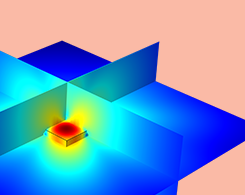
How to Use the Boundary Element Method in Acoustics Modeling
Learn advantages and strategies for using the boundary element method (BEM) for acoustics modeling. Plus, we go over a hybrid approach that combines BEM with the finite element method (FEM).

Using the Inflow Boundary Condition in Nonisothermal Flow Simulations
Nonisothermal flow is a multiphysics problem, as it combines CFD and heat transfer analysis. Learn how to implement the Inflow boundary condition when simulating these types of scenarios.

Happy Birthday, Albert Einstein
Albert Einstein, Nobel prize winner and “Person of the Century”, is known for developing the special and general theories of relativity and the law of the photoelectric effect.

Modeling Phase Change in a Thermosiphon
A guest blogger from Noumenon Multiphysics writes about modeling phase change in a thermosiphon, a device that has been keeping houses warm since the 1800s.

How to Run on Clusters from the COMSOL Desktop® Environment
You can run large simulations remotely on HPC hardware directly from the COMSOL Desktop® graphical environment. Learn how in this tutorial blog post.

Top 4 Reasons to Attend the COMSOL Conference
Thinking of attending the COMSOL Conference this year? There are many reasons why you should, but here, we outline 4 of them in particular…

Advancing Additive Manufacturing with Sequential Simulations
In some ways, additive manufacturing is like sewing or weaving. We talk to a professor of additive manufacturing about how sequential simulations can be used to analyze and optimize the process.

Happy Birthday, Joseph von Fraunhofer
Joseph von Fraunhofer is known for developing the spectroscope and discovering a set of spectral lines that are now known as Fraunhofer lines.
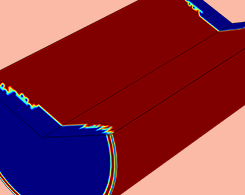
Analyzing Triaxial Testing Methods for Geomechanics
Triaxial testing of soil is important when determining the structural stability of a tunnel, dam, or building. Geomechanics simulation can help ensure that triaxial testing methods are up to par.

Happy Birthday, Frances Spence
Frances Spence worked on the first digital computer, Electronic Numerical Integrator and Computer (ENIAC), during WWII. Learn more about her dedication to computer programming and STEM.

Acoustic Topology Optimization with Thermoviscous Losses
A guest blogger from GN Hearing discusses including thermoviscous losses in the topology optimization of microacoustic devices, such as hearing aids, mobile phones, and metamaterial geometries.
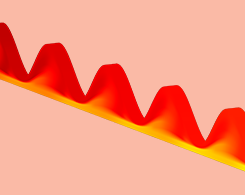
Comparing Static and Dynamic Wall Heat Exchangers with Simulation
We compare the performance and efficiency of static and dynamic compact wall heat exchanger designs using fluid-structure interaction.
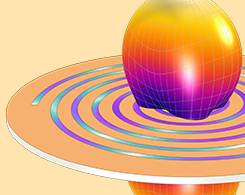
Designing Spiral Slot Antennas with Electromagnetics Simulation
Spiral slot antennas have nearly perfect circularly polarized radiation and wideband frequency response, and they can maintain a consistent radiation pattern and impedance over large bandwidths.

Analyzing Vehicle Suspension with Multibody Dynamics Modeling
How much damage can a pothole do to a car? Automotive engineers can set up lumped mechanical systems in COMSOL Multiphysics® to analyze vehicle suspension technology.

Happy Birthday, Alessandro Volta
Alessandro Volta started out by studying how static electricity generates a physical response in frog legs. The unit of electric potential and electromotive force, the “volt”, is his namesake.
